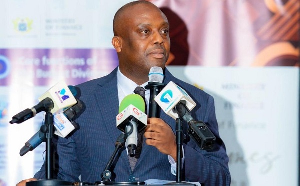Accra, May 17, GNA - Interior Minister Albert Kan-Dapaah on Thursday called on African leaders to invest in peace building initiatives and conflict prevention to ensure sustainable economic development for the continent.
"African governments must see the need to invest in peace. We should be interested in peace building and conflict resolution because there cannot be development without peace", he said. Mr Kan-Dapaah was speaking at a day's consultative meeting of peace building, human rights, and media organisations in Accra. The meeting, which coincided with the 41st Session of the African Commission on Human and Peoples Rights, seeks to create a tripartite partnership in the institutionalization of the culture of conflict prevention in the sub-region.
It is being organised by the West African Network for Peace building (WANEP) and sponsored by IBIS, a Danish development organisation. It brought together experts from the media, peace building and human rights organisations.
The meeting was on the theme: "In Search of a Common Ground among Peace Building, Human Rights Institutions and the Media for the Prevention of Violent Conflicts in West Africa". The Interior Minister noted that while governments invested in infrastructures, health and education, it was equally important that it found ways of developing peace for lasting progress. He said though the sub-region had had its fair share of protracted civil conflicts, some of which had not yet been fully resolved, countries like Ghana should not absolve itself from this situation, even though it plays a major role in resolving them. Mr Kan-Dapaah said in view of the sacrifices that Ghanaians had made over the years to ensure that the country was what it was today; government could not afford to fail the people by not investing in peace.
"We have so many reasons not to allow peace to leave our shores. And our government and politicians should not be forgiven if it happens otherwise", he said.
The Minister stressed the need for governments to protect the human rights of its people, as abuses had been the major cause of conflicts in some countries.
"Today's human rights abuses are the causes of conflicts tomorrow. We cannot have peace when a section of society believes the system does not favour them", he said
Mr Kan-Dapaah also called on the media to be circumspect in their reports, as evidence adduced from certain conflicts had pointed to the fact that media reports had fanned them. "The media itself can be the cause of conflicts through some of the allegations they make.
"But peace would be obtained when there is a media that upholds human rights issues and its related problems", he said. Mr Emmanuel Bombamde, Executive Director, WANEP, said the nature and trend of conflicts had changed since the end of the cold war from ideological differences to internal with the tendency to escalate in the sub-region.
Mr Bombamde said that the bi-polar power structure that defined the world had also been replaced with a multi-polar structure where large a number of countries possessed the capacity to destroy the world and themselves.
"Characteristically, conflicts are now multidimensional, multi-factional, and often producing complex and anarchic emergencies" he said.
Mr Bombamde said peace-building fields had not sufficiently been integrated and engaged with Human Rights and media practitioners even though they operated in the same circle and needed one another. Madam Oury Traore, Regional Programme Manager, WANEP, said human rights were the foundation for peace, development and that its abuses had been the causes of development crises and conflicts. "For development goals to be achieved and for lasting peace to prevail, respect, promotion and protections of human rights should be foremost", she said.
Madam Traore recognised the importance of the media as fundamental mechanism to assist in conflict prevention and peace-building initiatives adding that the media was often among the first witnesses of human rights abuses.
Madam Traore noted that the media could, however, be a target of manipulation of fighting factions or deliberate provocation to escalate conflict if not properly checked.
General News of Thursday, 17 May 2007
Source: GNA












